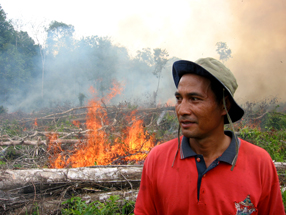 Yesterday, the U.N. announced it would spend $18 million in five pilot countries to reduce greenhouse gas emissions caused by deforestation while supporting local populations. The project — known as Reducing Emissions from Deforestation and forest Degradation (REDD) — will be launched in Democratic Republic of Congo, Indonesia, Papua New Guinea, Tanzania and Vietnam in advance of the Copenhagen climate summit taking place in December of this year.
Yesterday, the U.N. announced it would spend $18 million in five pilot countries to reduce greenhouse gas emissions caused by deforestation while supporting local populations. The project — known as Reducing Emissions from Deforestation and forest Degradation (REDD) — will be launched in Democratic Republic of Congo, Indonesia, Papua New Guinea, Tanzania and Vietnam in advance of the Copenhagen climate summit taking place in December of this year.
The Intergovernmental Panel on Climate Change has estimated that the forestry sector now accounts for about 17% of greenhouse gases entering the atmosphere. The REDD pilot participants hope to reduce greenhouse gas emissions both by using forest vegetation as a “carbon sink” to absorb excess amounts of carbon dioxide and by avoiding pollutants released during “slash and burn” clearing fires used to create fields for agriculture or livestock. The countries plan to employ local residents to monitor the forests’ health, thus providing economic benefits to the communities involved. Once an accounting method is agreed upon to determine how much carbon is being saved, REDD projects may be able to sell carbon credits to polluting nations to offset their emissions.
In 2008, WIDE ANGLE’s Burning Season reported on the attempts of carbon entrepreneur, Dorjee Sun, to protect Indonesia’s rainforests while making a profit for his investors.
